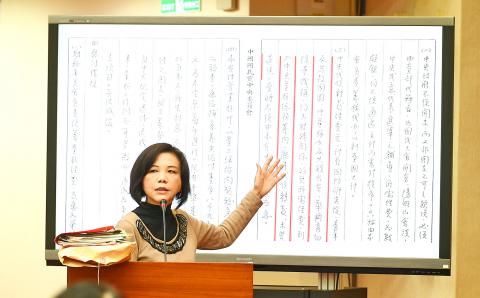Legislators yesterday clashed over the fairness of the bills targeting the ill-gotten assets of the Chinese Nationalist Party (KMT) during the legislature’s first official hearing.
The marathon hearing by the Legislative Yuan’s Internal Administration Committee, Finance Committee and Judiciary and Organic Laws and Statutes Committee started early in the morning and stretched into the evening, with the conclusion postponed when time ran out with more than 50 legislators yet to speak.
Seventy-five out of the Legislative Yuan’s 113 legislators had registered to question government officials regarding the legislation, which has drawn attention due to the long-standing controversy over KMT assets.

Photo: Chang Chia-ming, Taipei Times
KMT properties and investments dwarf those belonging to all other parties and are alleged to have been accumulated as a result of the party abusing its influence under the authoritarian one-party rule.
Sparks flew throughout the hearing as legislators traded barbs over the fairness of proposed legislation.
“We are willing to be open and candid in dealing with the issue of party assets, and give them up to move forward, but today’s review is too targeted and vengeful,” KMT caucus whip Lai Shyh-bao (賴士葆) said, adding that the hearing only sought to summon KMT party representatives for questioning.
All major parties that have received government subsidies over the past 10 years should be required to fully disclose financial records and accept questioning at the Legislative Yuan, he said, condemning the legislation sponsored by Democratic Progressive Party (DPP) legislators for only applying to the KMT.
Representatives from the KMT’s central party organization boycotted the hearing.
Lai also said the legislation would likely be unconstitutional, as it violates the separation of powers by allowing the Executive Yuan to establish a committee with judicial investigative powers.
KMT objections were rebuffed by legislators from the pan-green camp, who contended that the KMT should be held to higher standards because of its history.
DPP Legislator Cheng Yun-peng (鄭運鵬) responded that the proposed bills targeting the KMT was appropriate, because it was the only party that could reasonably be suspected of having “illicit assets.”
DPP party articles forbid it from investing or operating businesses, he said, adding that other parties have lacked the authority and opportunity to accumulate assets.
“Of course this legislation is targeted. It is targeted at illicit assets — if you acquired them legally there is nothing anyone could do to you,” DPP Legislator Chuang Ruei-hsiung (莊瑞雄) said. “Of course this is a ‘hunt,’ but it is a hunt for illicit assets, not property belonging to ordinary people.”
Implementing the proposed legislation retroactively was justified due to the KMT’s unjust acquisition of assets, DPP Legislator Hsu Kuo-yung (徐國勇) said, adding that the party should be required to prove the legality of all of its assets.
DPP caucus whip Ker Chien-ming (柯建銘) brushed off KMT claims that it was willing to divest itself of “illicit assets.”
“The KMT’s actions and words are at odds,” Ker said. “The KMT says it is not opposed [to taking care of illicit assets], but you know it is the minute you look at its proposed legislation. It is written very clearly: No satellite organizations are to be pursued, and any controversy is to go to the Control Yuan, which they control.”
He called for the issue of KMT assets to be handled as part of a broader framework to achieve transitional justice, which he defined as facing history to allow the nation to normalize.

Taiwanese can file complaints with the Tourism Administration to report travel agencies if their activities caused termination of a person’s citizenship, Mainland Affairs Council Minister Chiu Chui-cheng (邱垂正) said yesterday, after a podcaster highlighted a case in which a person’s citizenship was canceled for receiving a single-use Chinese passport to enter Russia. The council is aware of incidents in which people who signed up through Chinese travel agencies for tours of Russia were told they could obtain Russian visas and fast-track border clearance, Chiu told reporters on the sidelines of an event in Taipei. However, the travel agencies actually applied

Japanese footwear brand Onitsuka Tiger today issued a public apology and said it has suspended an employee amid allegations that the staff member discriminated against a Vietnamese customer at its Taipei 101 store. Posting on the social media platform Threads yesterday, a user said that an employee at the store said that “those shoes are very expensive” when her friend, who is a migrant worker from Vietnam, asked for assistance. The employee then ignored her until she asked again, to which she replied: "We don't have a size 37." The post had amassed nearly 26,000 likes and 916 comments as of this

New measures aimed at making Taiwan more attractive to foreign professionals came into effect this month, the National Development Council said yesterday. Among the changes, international students at Taiwanese universities would be able to work in Taiwan without a work permit in the two years after they graduate, explainer materials provided by the council said. In addition, foreign nationals who graduated from one of the world’s top 200 universities within the past five years can also apply for a two-year open work permit. Previously, those graduates would have needed to apply for a work permit using point-based criteria or have a Taiwanese company

The Shilin District Prosecutors’ Office yesterday indicted two Taiwanese and issued a wanted notice for Pete Liu (劉作虎), founder of Shenzhen-based smartphone manufacturer OnePlus Technology Co (萬普拉斯科技), for allegedly contravening the Act Governing Relations Between the People of the Taiwan Area and the Mainland Area (臺灣地區與大陸地區人民關係條例) by poaching 70 engineers in Taiwan. Liu allegedly traveled to Taiwan at the end of 2014 and met with a Taiwanese man surnamed Lin (林) to discuss establishing a mobile software research and development (R&D) team in Taiwan, prosecutors said. Without approval from the government, Lin, following Liu’s instructions, recruited more than 70 software